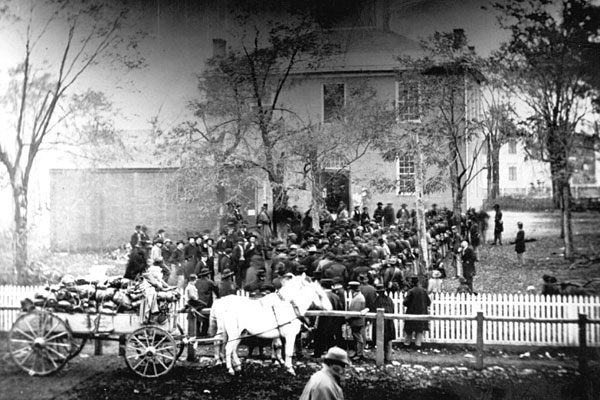This essay first appeared in National Review, 6/1, June 21, 1958, 18-19.
Just one hundred years ago Abraham Lincoln and Stephen A. Douglas were stumping Illinois for tire office of United States Senator. They made a total of eighty-three appearances before the voters of that state, seven of which were in the form of joint debates. Now, on this anniversary of that famous contest, the University of Chicago Press has performed a service in bringing these debates to the public in a new and scholarly edition: Created Equal? The Complete Lincoln-Douglas Debates of 1858. In addition to complete texts, the volume contains an introduction by its editor, Paul M. Angle, and many illuminating sidelights from newspaper accounts of the time.
The prospective reader should be cautioned, however, not to raise his expectations too high. Despite the important place they hold in American political history, these clashes are not of uniformly high forensic quality. A large amount of time was taken up with incrimination and recrimination Each candidate charged the other with being party to a “conspiracy.” Lincoln claimed that Douglas had entered into a conspiracy to make the institution of slavery national, by inserting a provision in the “Nebraska Bill’ which would remove the restriction imposed by the Missouri Compromise and eventually make it unconstitutional for any state to prohibit slavery Douglas claimed that Lincoln had entered into a conspiracy with certain leaders to dissolve the old Party and the Democratic Party by “abolitionizing” them, in return for which he was to get a seat in the Senate. These charges were aired and parried at nearly every meeting.
There is no doubt, however, about the real issue, which was what to do about slavery. And though he won the election, there is no doubt that Douglas got the worst of the argument. In the final debate he was reduced intellect Douglas was not even a little giant. Lincoln, on the other hand, was a master of argument, and his method was one that Douglas was peculiarly unfitted to cope with.
I would suggest that it is from the methods of the two men that the philosophic historian and the student of public affairs can learn most. It is apparent from the first that Lincoln was primarily a dialectician, engaged in trying to define certain terms. Douglas was replying to him as a rhetorician, and a rather poor one at that. In this role Douglas allowed himself to he caught doing one thing which the student of logic or any person with a good logical mind is most studious to avoid: he allowed himself to be caught playing around in the excluded middle.
The law of logic says that between two contradictories there is no middle ground. And Douglas kept trying to steer away from any commitment. The Question was: what is the Negro? Is he a man? Is he a slave? Is he a free and equal citizen? Douglas would never say. As far as argument goes, any one of these alternatives would have been better than the position he took, which was that every state and territory had the right to answer the question in its own way, and that there the matter must rest. The nature of the Negro was therefore tor him purely a matter of political determination.
Lincoln, on the contrary, took a stand, though it was a very limited one, and I do not doubt that many of his admirers will be surprised to learn how conservative he was on the race question. In replying to Douglas in the debate at Ottawa, he declared: “I have no purpose to introduce political and social equality between the white and black races. There is a physical difference between the two which in my judgment will probably forever forbid their living together upon the footing of perfect equality, and inasmuch as it becomes a necessity that there must be a difference, I, as well Judge Douglas, am in favor of the race to which I belong having the superior position.” Earlier in a speech at Springfield he had said: “What I would most desire would he a separation of the white and black races.”
Lincoln’s definition was simply that the Negro was a creature entitled to the fruits of his own toil. That, he argued insistently, was the definition implied by the Declaration of Independence, and his object was to place slavery where he thought the Founders of the Republic had placed it, namely in a position pointing toward ultimate extinction. Since Lincoln was willing to say what he thought the Negro was, and Douglas was not, the argument as argument could have but one outcome. Minimal as his definition was, it gave Lincoln a position from which he could attack and defend. Douglas had no defense except rhetorical appeals to a vague abstraction called “popular sovereignty” and to the prestige of the Supreme Court, which had just handed down the Dred Scott decision. The apostrophes of Douglas to this as “the law of the land,” to be regarded as final and unquestionable, sound curiously like those being used today to protect the “desegregation” order from attack. Lincoln had no such reverence for this “law of the land” and said expressly that he expected to get it changed. “Somebody has to reverse that decision, since it is made, and we mean to reverse it,” he asserted.
Lincoln did provide Douglas with one opening which the latter exploited with a degree of success. This was his famous statement to the effect that a house divided against itself cannot stand. Douglas was quick, if not very skillful, in pointing out that such doctrine, if pushed to its logical limit, is the principle of despotic government. “Uniformity is the parent of despotism the world over, not only in politics but in religion,” he answered. Lincoln had to spend a lot of time in subsequent speeches digging himself out of that one, explaining that “it would be foolish for us to insist on having a cranberry law here in Illinois, where we have no cranberries, because they have a cranberry law in Indiana, where they have cranberries.”
The issue was a potent one, of course, because it involves the idea of nationalization and the extent to which a state composed of many units should centralize its laws. Despite his disclaimer, Lincoln never made a very convincing case for states’ rights. Douglas, on the other hand, never sounded very convincing in his real or pretended moral indifference to slavery, which he expressed by saying that he did not care whether slavery “was voted up or voted down.” And furthermore Lincoln was protected by the very limited claim he made for the Negro, which would allow the states to make about any regulations for him they chose as long as his bondage was removed.
No case of course is a hundred per cent one way, and if Lincoln was the better controversialist, Douglas was the better prophet. I believe, moreover, that these facts are very closely related to their respective character as dialectician and rhetorician. It is the work of the dialectician to form definitions and to work out their logical implications. It is the work of the rhetorician to take cognizance of prevailing values and of the urgency of historical forces. Douglas had said in a speech at Chicago: “Mr. Lincoln advocates boldly and clearly a war of sections, a war of the North against the South, of the free states against the slave states—a war of extermination—to be conducted relentlessly until one or the other shall be subdued. . . .” Lincoln said that anything like that was very far from his conception. Yet it was only a few years until the prophecy was fulfilled. If Lincoln was the better logician, Douglas had the better intuition of the situation.
What if Lincoln had been opposed then and in 1860 not by a third-rate rhetorician, but by a great one (who must by definition be also a pretty fair dialectician)? What if he had been opposed by someone of the caliber of Patrick Henry or Daniel Webster, who might have realized for the people with irresistible vividness the danger in the explosive forces which had built up? It is only speculation, but Lincoln might have polled considerably less than the forty per cent of the vote he received nationally, and the United States might have missed having its most mythogenic president.







